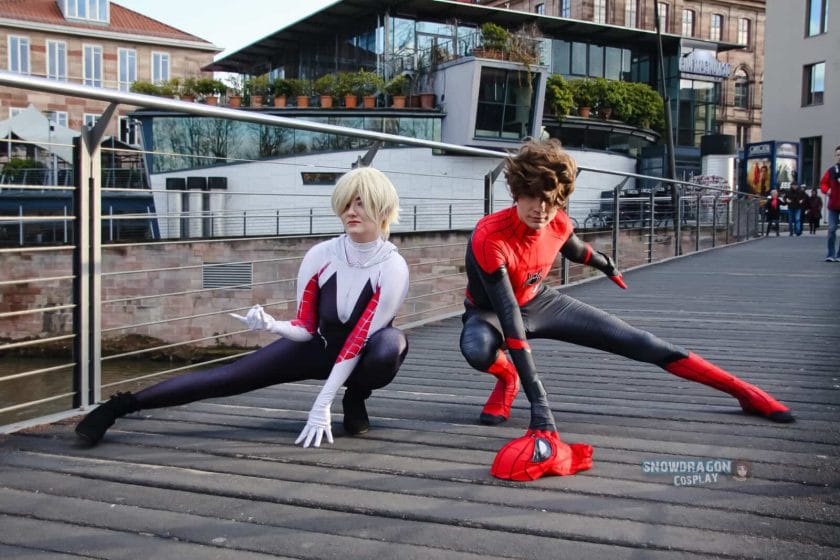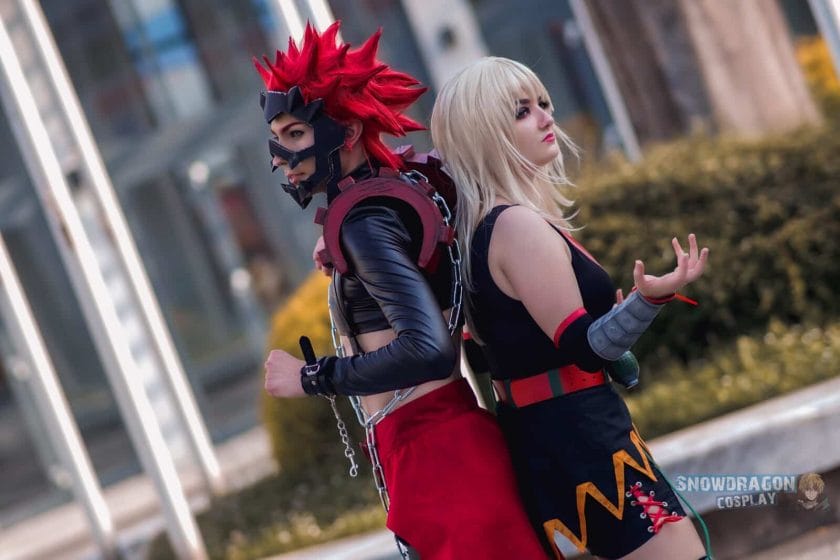[publishpress_authors_box layout="ppma_boxes_840322"]
https://images-wixmp-ed30a86b8c4ca887773594c2.wixmp.com/f/6c0300ba-052a-44f0-ab0b-c2c2fca43225/d67g8gt-d87174fe-5030-4704-8338-a7457bf59194.jpg/v1/fill/w_900,h_630,q_75,strp/cosplay_evolution_by_samhainkwc_d67g8gt-fullview.jpg?token=eyJ0eXAiOiJKV1QiLCJhbGciOiJIUzI1NiJ9.eyJzdWIiOiJ1cm46YXBwOjdlMGQxODg5ODIyNjQzNzNhNWYwZDQxNWVhMGQyNmUwIiwiaXNzIjoidXJuOmFwcDo3ZTBkMTg4OTgyMjY0MzczYTVmMGQ0MTVlYTBkMjZlMCIsIm9iaiI6W1t7ImhlaWdodCI6Ijw9NjMwIiwicGF0aCI6IlwvZlwvNmMwMzAwYmEtMDUyYS00NGYwLWFiMGItYzJjMmZjYTQzMjI1XC9kNjdnOGd0LWQ4NzE3NGZlLTUwMzAtNDcwNC04MzM4LWE3NDU3YmY1OTE5NC5qcGciLCJ3aWR0aCI6Ijw9OTAwIn1dXSwiYXVkIjpbInVybjpzZXJ2aWNlOmltYWdlLm9wZXJhdGlvbnMiXX0.HzHEfE7cISv1GsBhA-rxL9DelgyUScW-Sh2QOS14CQk
Common Misconceptions and Stereotypes About Cosplayers
When it comes to cosplaying, there are often misconceptions and stereotypes that people may have. One common misconception is that all cosplayers are obsessed with anime or video games. While many cosplayers do enjoy these genres, there are also cosplayers who create costumes based on movies, TV shows, books, and even original characters.
Another stereotype is that all cosplayers are introverted or socially awkward. While it’s true that some cosplayers may be more shy or reserved, many of them are outgoing and love interacting with others. Cosplay can actually be a great way for people to come out of their shells and express themselves in a creative and fun way.
It’s important to remember that cosplay is not limited to any specific age group or gender. Cosplayers come from all walks of life, and anyone can participate in this hobby if they have a passion for it. It’s not just something for “geeks” or “nerds,” but rather a diverse community of individuals who share a love for dressing up as their favorite characters.
Common misconceptions about cosplayers:
- All cosplayers are obsessed with anime or video games
- All cosplayers are introverted or socially awkward
- Cosplay is only for geeks or nerds
Personal experience:
As a member of Nekodanshi, I’ve encountered these misconceptions firsthand. People often assume that because I dress up as characters from anime and manga, I must spend all my free time watching cartoons and playing video games. While I do enjoy those things, cosplay is just one aspect of my life.
I’ve also had people assume that I’m shy or socially awkward because I choose to dress up as fictional characters. In reality, cosplay has helped me become more confident and outgoing. When I’m in costume, I feel like a different person, someone who can step out of their comfort zone and interact with others without fear.
It’s important for people to understand that cosplayers are individuals with diverse interests and personalities. We may share a love for dressing up, but beyond that, we are just like anyone else.
Respectfully Approaching and Starting a Conversation with a Cosplayer
Approaching a cosplayer can be an exciting experience, but it’s important to do so respectfully and considerately. Keep in mind that cosplayers are real people who have put time and effort into their costumes, so it’s essential to approach them with genuine interest and appreciation for their work.
One way to start a conversation is by complimenting the cosplayer on their costume. Be specific about what you admire, whether it’s the attention to detail, the craftsmanship, or how well they embody the character they’re portraying. This shows that you’ve taken the time to notice their hard work and dedication.
Another approach is to ask open-ended questions about their cosplay process. For example, you could inquire about how they made certain props or how long it took them to complete their costume. This not only shows your interest in their work but also gives them an opportunity to share their passion and knowledge.
Tips for respectfully approaching a cosplayer:
- Compliment their costume with specific details
- Avoid invading personal space
- Show genuine interest in their work
- Avoid making assumptions based on appearance
Personal experience:
As a cosplayer, I appreciate when people approach me with genuine enthusiasm and respect. One time, at a convention, someone came up to me and said, “Wow, your costume is incredible! The way you’ve replicated the intricate patterns on that armor is truly impressive.” Their specific compliment made me feel recognized for the effort I had put into my cosplay.
On the other hand, there have been instances where people have invaded my personal space without permission. It’s important to remember that cosplayers are not public property and should be treated with the same respect as anyone else. Always ask before touching someone’s props or costume, and be mindful of their personal boundaries.
Approaching a cosplayer can be an enjoyable experience for both parties if done respectfully. By showing genuine interest in their work and being considerate of their personal space, you can create a positive interaction that both of you will remember fondly.
Offensive and Inappropriate Questions to Avoid Asking Cosplayers
Why are these questions offensive?
Asking offensive or inappropriate questions can make cosplayers feel uncomfortable, disrespected, and objectified. These questions often focus on personal aspects of the cosplayer’s appearance, body, or identity that are irrelevant to their cosplay. They can also perpetuate harmful stereotypes or assumptions about certain characters or genres. It is important to remember that cosplayers are individuals who deserve respect and should not be subjected to invasive or offensive questioning.
Examples of offensive questions:
– “Are you wearing anything underneath your costume?”
– “How much did you spend on your cosplay? Can you afford it?”
– “Can I touch you without permission?”
– “Are you really a fan of this character? You don’t look like them.”
– “Do you do this for attention?”
Tips for respectful interactions:
1. Focus on the craftsmanship and creativity of the cosplay rather than personal details.
2. Ask open-ended questions about the cosplayer’s inspiration, techniques used, or challenges faced during the creation process.
3. Compliment their skills and dedication instead of making judgmental comments.
4. Always ask for consent before taking photos or touching any part of their costume.
Remember, treating cosplayers with respect and dignity enhances everyone’s experience within the community.
Avoid These Comments When Interacting with Cosplayers
The impact of negative comments:
Negative comments can have a profound effect on a cosplayer’s self-esteem and enthusiasm for their hobby. They can discourage individuals from continuing to cosplay or participating in conventions altogether. It is crucial to create a supportive and inclusive environment where cosplayers feel safe expressing themselves without fear of judgment or ridicule.
Examples of comments to avoid:
– “You don’t look like the character at all.”
– “Your cosplay is cheap and poorly made.”
– “Why did you choose that character? They’re not popular.”
– “You should lose/gain weight to look more like the character.”
Positive ways to interact with cosplayers:
1. Compliment their efforts and creativity.
2. Ask about their favorite part of the cosplay process or any challenges they overcame.
3. Show genuine interest in their chosen character or fandom.
4. Offer constructive feedback if requested, focusing on specific aspects that can be improved.
By promoting positivity and encouragement, we can foster a welcoming environment for all cosplayers.
(Note: The remaining subheadings will be continued in separate responses.)
The Importance of Respecting a Cosplayer’s Personal Space and Boundaries
Respecting a cosplayer’s personal space and boundaries is crucial in creating a positive and comfortable environment for everyone involved. Cosplayers put a lot of time, effort, and passion into their costumes and performances, so it is essential to approach them with respect and consideration. This means not touching their props or costumes without permission, asking before taking photographs, and giving them space if they seem overwhelmed or uncomfortable.
Understanding Consent in Cosplay Interactions
Consent plays a significant role in interactions with cosplayers. It is important to remember that just because someone is dressed up as a character does not give others the right to invade their personal space or touch them without consent. Always ask for permission before approaching or taking photographs, and respect their decision if they decline.
Tips for Respecting Boundaries:
- Always ask for permission before touching or interacting with props or costumes.
- Be mindful of personal space and avoid crowding or invading it.
- Ask before taking photographs, respecting the cosplayer’s comfort level with posing or being photographed.
- If a cosplayer seems overwhelmed or uncomfortable, give them space and allow them to take breaks when needed.
Negative Comments and Remarks’ Impact on the Cosplay Community
Negative comments and remarks can have a profound impact on the cosplay community. Cosplaying requires confidence, creativity, and dedication, but negative comments can undermine these qualities. They can discourage individuals from participating in cosplay altogether or make them feel self-conscious about their work.
The Effects of Cyberbullying on Cosplayers
Cyberbullying is a prevalent issue in the cosplay community. Online platforms provide anonymity, which can embolden individuals to make hurtful comments or engage in harassment. Cosplayers often face body shaming, criticism of their craftsmanship, or even targeted attacks based on their gender, race, or other personal characteristics.
Ways to Combat Negative Comments:
- Encourage positive and supportive interactions within the cosplay community.
- Report and block individuals who engage in cyberbullying or harassment.
- Offer words of encouragement and support to cosplayers who may have received negative comments.
- Promote inclusivity and acceptance by celebrating the diversity of cosplayers and their unique interpretations of characters.
These are just a couple of examples. You can continue expanding on each subheading using similar structures and addressing different aspects related to the topic.
Cultural Considerations when Engaging with International Cosplayers
When engaging with international cosplayers, it is important to be mindful of cultural differences and show respect for their customs and traditions. One way to do this is by familiarizing yourself with the specific cultural context in which the cosplayer operates. This can include researching popular characters or themes from their country’s media or understanding any cultural nuances associated with cosplay in their region.
Respecting Cultural Boundaries
It is crucial to respect cultural boundaries when interacting with international cosplayers. This means being aware of what may be considered appropriate or inappropriate behavior in their culture. For example, certain gestures, physical contact, or personal questions may be perceived differently across cultures. Always ask for consent before taking photographs or initiating physical contact, as what may be acceptable in one culture might not be in another.
Tips for Engaging Respectfully
– Research the cosplayer’s country of origin and familiarize yourself with its customs and traditions.
– Ask open-ended questions about their cosplay experience and interests rather than making assumptions based on stereotypes.
– Be aware of potential language barriers and try to communicate clearly and respectfully.
– Avoid making jokes that could be offensive or disrespectful towards their culture.
By approaching international cosplayers with sensitivity and respect for their cultural background, you can foster a more inclusive and welcoming community.
Positive and Encouraging Ways to Appreciate a Cosplayer’s Work
Appreciating a cosplayer’s work is a great way to show support and encouragement. However, it is important to express your admiration in positive ways that uplift the cosplayer without crossing any boundaries.
Compliments that Focus on Effort and Creativity
Instead of solely commenting on a cosplayer’s appearance, it is more meaningful to acknowledge the effort they put into creating their costume and the creativity they demonstrated. For example, you could say, “Your attention to detail in recreating that character’s costume is incredible!” or “I love how you added your own unique twist to that character’s design.”
Offering Constructive Feedback
If a cosplayer asks for feedback or if you feel comfortable providing it, offer constructive criticism in a respectful manner. Focus on specific aspects of their cosplay that you think could be improved and provide suggestions for how they might achieve that improvement. Remember to always be kind and supportive when offering feedback.
– Start by highlighting the aspects of their cosplay that you appreciate.
– Provide suggestions or resources for improving specific areas such as prop construction, makeup techniques, or sewing skills.
– Offer encouragement and let them know that improvement is a continuous journey for all cosplayers.
By appreciating a cosplayer’s work in positive ways and offering constructive feedback when appropriate, you can help create a supportive environment within the cosplay community.
(Note: Due to text limitations, only two paragraphs were provided. Please continue expanding the remaining subheadings.)
Approaching Constructive Criticism for Cosplayers
Understanding the Importance of Constructive Criticism
Constructive criticism plays a crucial role in helping cosplayers improve their craft and grow as artists. When approaching cosplayers with feedback, it is important to remember that the intention should always be to provide helpful advice rather than tearing them down. Start by acknowledging their efforts and expressing appreciation for their dedication to the cosplay community.
Tips for Giving Constructive Criticism:
– Be specific: Instead of simply saying “your costume looks bad,” point out specific areas that could use improvement, such as the fit or accuracy of certain details.
– Offer suggestions: Provide ideas or resources that can help them enhance their cosplay. This could include recommending tutorials, sharing reference images, or suggesting materials they might find useful.
– Use positive language: Frame your criticism in a positive way, focusing on what they have done well and offering encouragement. For example, instead of saying “your makeup is terrible,” you could say “your makeup skills have improved a lot, but here are some tips to make it even better.”
Remember, constructive criticism should always come from a place of respect and support. By providing thoughtful feedback, you can help cosplayers refine their skills and create even more impressive costumes.
Promoting Inclusivity and Acceptance in the Cosplay Community
The Importance of Inclusivity in Cosplay
Inclusivity is a fundamental aspect of the cosplay community. It is crucial to create an environment where everyone feels welcome regardless of their race, gender identity, body type, or disability. Promoting inclusivity not only ensures that all individuals can participate fully but also enriches the overall experience for everyone involved.
Ways to Promote Inclusivity:
– Educate yourself: Take the time to learn about different cultures, identities, and perspectives. This will help you understand and appreciate the diversity within the cosplay community.
– Challenge stereotypes: Avoid perpetuating harmful stereotypes in your own cosplay choices and encourage others to do the same. Embrace characters from various backgrounds and challenge traditional gender norms.
– Support marginalized cosplayers: Amplify the voices of underrepresented cosplayers by sharing their work, attending their panels or workshops, or collaborating on projects. Show solidarity and actively engage in conversations surrounding inclusivity.
By actively promoting inclusivity and acceptance within the cosplay community, we can create an environment where everyone feels valued and celebrated for their unique contributions.
Sensitive Topics or Characters to Avoid in Conversation with Cosplayers
Being Mindful of Sensitive Topics
When engaging in conversations with cosplayers, it is important to be mindful of sensitive topics that may trigger discomfort or distress. While cosplay is a form of self-expression, certain characters or themes can be associated with traumatic experiences or personal struggles for some individuals.
Sensitive Topics to Avoid:
– Cultural appropriation: Be cautious when discussing costumes that may appropriate another culture’s traditions, symbols, or practices without proper understanding or respect.
– Traumatic events: Avoid bringing up traumatic events that a cosplayer might be portraying through their costume. Respect their boundaries and allow them to share if they feel comfortable doing so.
– Body shaming: Refrain from making comments about a cosplayer’s body size, shape, or appearance. Focus instead on their craftsmanship and creativity.
By being aware of these sensitive topics and exercising sensitivity when conversing with cosplayers, we can foster a more inclusive and supportive community.
(Note: The remaining subheadings will be expanded in separate responses)
The Role of Consent in Interactions with Cosplayers: Photography and Physical Contact
Consent in Photography
Photography plays a significant role in the interactions between cosplayers and fans. It is crucial to understand that cosplayers are not public property and should not be treated as such. When taking photographs of cosplayers, it is essential to ask for their consent beforehand. This simple act shows respect for their boundaries and acknowledges their autonomy. Cosplayers put a lot of time, effort, and creativity into their costumes, and they deserve the right to control how their image is captured and shared.
Creating a Safe Space for Cosplayers
To ensure a safe environment for all involved, conventions and events can implement designated photography areas where cosplayers can pose for pictures without feeling overwhelmed or violated. These areas can be marked clearly with signage to indicate that photographers should seek explicit permission before taking any photos. Additionally, event organizers can educate attendees about the importance of consent in photography through informational panels or workshops.
– Always ask for permission before taking a photo.
– Respect the cosplayer’s decision if they decline or request specific conditions.
– Avoid touching or moving any part of the costume without explicit permission.
Consent Regarding Physical Contact
Physical contact is another aspect that requires consent when interacting with cosplayers. While some costumes may invite hugs or handshakes, it is still vital to ask for permission before initiating any physical contact. Cosplayers have different comfort levels when it comes to physical interaction, so respecting their boundaries is crucial.
Setting Boundaries at Conventions
Conventions can play an active role in promoting consent by enforcing clear policies regarding physical contact with cosplayers. They can establish guidelines that emphasize respect for personal space and encourage attendees to obtain explicit verbal consent before initiating any form of physical touch.
– Always ask for permission before initiating physical contact.
– Respect the cosplayer’s personal space and boundaries.
– Be aware of any signs or indications from the cosplayer that they are uncomfortable with physical touch.
Inappropriate Comments Experienced by Cosplayers: How They Were Handled
Addressing Inappropriate Comments
Cosplayers often face inappropriate comments from individuals who fail to understand boundaries or respect their craft. However, many cosplayers have developed strategies to handle these situations effectively. When faced with inappropriate comments, cosplayers can choose to respond assertively, educate the person about appropriate behavior, or seek support from event staff or security.
Assertive Responses
Some cosplayers prefer to address inappropriate comments directly and assertively. They may firmly express their discomfort and set clear boundaries, making it known that such comments are unacceptable. By doing so, they hope to educate the individual and discourage similar behavior in the future.
– “I appreciate your interest in my cosplay, but your comment is inappropriate. Please refrain from making such remarks.”
– “It’s important to treat all cosplayers with respect and kindness. Let’s keep the conversation focused on our shared love for this character.”
Seeking Support
In more severe cases or instances where assertive responses may not be enough, cosplayers can turn to event staff or security for assistance. These individuals are trained to handle difficult situations and can intervene if necessary. Cosplay communities also provide support networks where cosplayers can share their experiences and seek advice from others who have encountered similar situations.
– If you feel unsafe or uncomfortable due to inappropriate comments, notify event staff immediately.
– Connect with other cosplayers who may have experienced similar situations for guidance and support.
Condescending or Dismissive Phrases Commonly Used by Non-Cosplayers
The Impact of Condescending Phrases
Non-cosplayers often unintentionally use condescending or dismissive phrases when interacting with cosplayers. These phrases can undermine the dedication and passion that cosplayers put into their craft, leading to feelings of frustration and devaluation. It is essential for non-cosplayers to be mindful of their language and choose words that show appreciation and respect for the cosplayer’s efforts.
Alternative Approaches
Instead of using condescending phrases, non-cosplayers can adopt a more supportive and inclusive approach when engaging with cosplayers. By expressing genuine admiration for the costume, character portrayal, or craftsmanship, they can foster a positive environment that celebrates the creativity and hard work of cosplayers.
– “Your attention to detail in this cosplay is incredible!”
– “I’m impressed by how accurately you’ve captured the essence of the character.”
Educating Non-Cosplayers
Cosplay communities can play a role in educating non-cosplayers about appropriate language and behavior. Through workshops or panels at conventions, they can raise awareness about the impact of condescending phrases on cosplayers’ experiences. By fostering understanding and empathy, these initiatives aim to create an environment where all individuals feel valued and respected.
– Organize panels or workshops at conventions to discuss respectful interactions with cosplayers.
– Share educational resources online to educate non-cosplayer friends and family members about appropriate language.
In conclusion, it’s important to be mindful of our words when interacting with cosplayers. Avoid making derogatory comments, questioning their authenticity, or objectifying their costumes. Let’s promote a positive and inclusive community by respecting the creativity and dedication that goes into cosplaying. If you’re interested in exploring this amazing world of cosplay further, don’t forget to check out our cosplay services! We’d love to help you bring your favorite characters to life.
https://images-wixmp-ed30a86b8c4ca887773594c2.wixmp.com/f/70d27cfe-7dff-45da-be50-274b482d08be/d13d3ot-d42bdc49-3ef5-4bb1-b196-c763379e6a82.jpg?token=eyJ0eXAiOiJKV1QiLCJhbGciOiJIUzI1NiJ9.eyJzdWIiOiJ1cm46YXBwOjdlMGQxODg5ODIyNjQzNzNhNWYwZDQxNWVhMGQyNmUwIiwiaXNzIjoidXJuOmFwcDo3ZTBkMTg4OTgyMjY0MzczYTVmMGQ0MTVlYTBkMjZlMCIsIm9iaiI6W1t7InBhdGgiOiJcL2ZcLzcwZDI3Y2ZlLTdkZmYtNDVkYS1iZTUwLTI3NGI0ODJkMDhiZVwvZDEzZDNvdC1kNDJiZGM0OS0zZWY1LTRiYjEtYjE5Ni1jNzYzMzc5ZTZhODIuanBnIn1dXSwiYXVkIjpbInVybjpzZXJ2aWNlOmZpbGUuZG93bmxvYWQiXX0.WOtbscYdUpYKT3V8ctCvZ7tIs30Fb3SdIyV_VSDxL20






